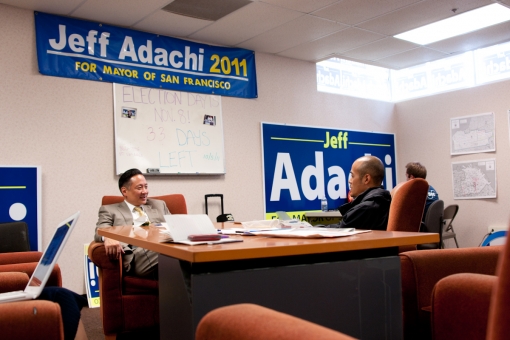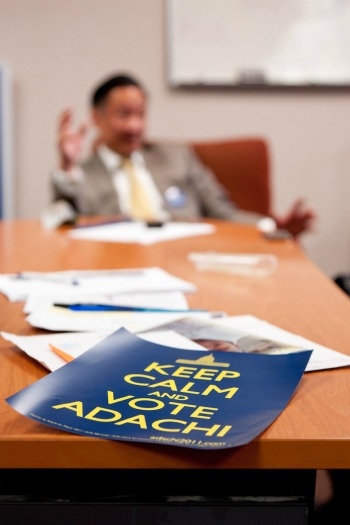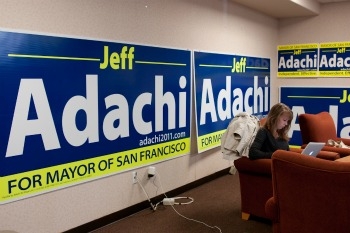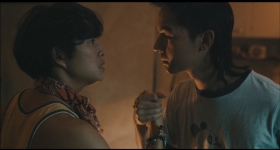Photography by JJ Casas (jjcasas.me)
So, Jeff Adachi ... kinda does everything. If one day all the public defenders’ offices across the country were suddenly closed, Adachi would have no fewer than five careers to fall back on.
In addition to having worked in the SF public defender’s office for the past 25 years, he’s also been the chairman of the Asian American Theatre Company, taught BAR/BRI bar review classes, started a publishing company to sell his study aids for the bar exam, produced two documentaries on Asian Americans in entertainment, and written two book-length works of fiction.
Most of that he did while working at the public defender’s office.
Now he’s vying to become the first elected Asian American mayor of San Francisco. He was an eleventh-hour candidate, waiting until the end of the day on August 12 -- the absolute deadline -- to file his papers. In fact, he didn’t even launch his campaign website until a few weeks ago.
Considering the fact that some candidates seem to have been running for years now, and that most of the serious contenders have been duking it out on- and off-line since the beginning of the summer, there’s something strikingly casual about Adachi’s style.
Even if his resume reads somewhat eclectically, Adachi insists that the red thread that runs through all of his experiences, even dating back to his undergraduate days as an Asian American Studies major at UC Berkeley, is that he’s always willing to stand up for the causes and communities that need a voice.
“If there’s any one mantra of my campaign,” he tells me with conviction, “it’s that Jeff Adachi’s going to stand up. That’s what I’ve done for my whole career.”
Not a Maniwala Boy
Adachi grew up in Sacramento. His father was an auto-mechanic and his mother a lab technician.
It wasn’t until third grade that he learned his parents and grandparents were interned. “I got into a fight with a kid at school who said my parents were in jail,” he recalls. “Then I went home and told my mom about it and she said, ‘Yeah, that’s true.’”
That moment was transformative for the young Adachi. “My reaction was shock. Everything I had been taught in school and in the history books had said that this country didn’t operate that way.”
It’s a scene that Adachi replays in a novella he wrote in his early twenties, Yancha!, about a young sansei named Jimmy and his journey from aimlessness to political consciousness. After Jimmy’s teacher tells his third grade history class about how the Japanese had been “appropriately” placed into relocation camps after Pearl Harbor, a white student in his class begins to taunt him:
Jimmy tried to ignore Brigger, but the words kept coming. Suddenly, Brigger kicked Jimmy’s books out of his hands. Jimmy calmly picked up his history book and knocked the wind out of Brigger. Although Jimmy was suspended from school for three days, he somehow never regretted knocking out John Brigger.
The image of a pugilist armed with a history book is fitting for Adachi.
He brought his awareness of injustice to college, first to Sacramento City College, and then UC Berkeley. It was as an undergrad that he learned about the case of Chol Soo Lee, a young Korean American man from San Francisco who was wrongfully convicted of murdering a Chinatown gang leader.
After meeting with investigative reporter K. W. Lee of the Sacramento Union, Adachi joined what would become a seven year long, nationally waged campaign advocating for Lee’s freedom. K. W. Lee was later nominated for a Pulitzer Prize for his series of articles on Lee, and the 1989 film True Believer, starring James Woods, Robert Downey, Jr., and Yuji Okumoto, was based on Lee’s story.
“Chol Soo Lee became a symbol for many of us for justice,” says Adachi. “I was there in court when he was acquitted, and that was a powerful moment.”
When asked what drove him to dedicate seven years of his life to Lee’s case, Adachi said, “It wasn’t only about getting someone out of prison, but helping people understand the impact of racism and how the criminal justice system doesn’t treat people the same, based on the kind of resources you have.”
In other words, it was the kind of dedication to social justice and community that Jimmy would have admired.
After a stint as a social worker in Los Angeles, Adachi came back to the Bay Area to enroll at UC Hastings School of Law. After graduating, he went to work at the San Francisco Public Defender’s Office as a Deputy, and spent more than a decade there before being tapped for the top job. In 2002, he was elected Public Defender by a large margin, and reelected in 2006 and 2010.

Election Day looms over Adachi.
Dedication to the Arts
In the ‘90s, Adachi devoted a great deal of his time to the arts and arts administration. From 1992-1995 he served as the chairperson of the Asian American Theatre Company in San Francisco’s Richmond District, raising funds and managing the logistics of the company’s productions.
In 1995, he founded the (now defunct) Asian American Arts Foundation, which distributed grants to Asian American artists and produced an awards show, The Golden Ring Awards, that recognized the achievements of Asian American artists like Joan Chen, Wayne Wang and DJ Qbert.
“We still don’t have representation, particularly in front of the camera,” Adachi says. “We expected that, after the '90s, there would be an explosion of young Asian American filmmakers, like Justin Lin [director of Better Luck Tomorrow (2002)], but that didn’t happen.”
His passion for the arts and concerns over representation in entertainment led to his involvement as a producer, and eventually writer and director, of a documentary called The Slanted Screen, which explores the stereotyping of Asian American men in film through a series of interviews with actors like Jason Scott Lee and Dustin Nguyen.
The Slanted Screen toured the festival circuit before being aired on PBS in 2007. It also precipitated Adachi’s second documentary project, You Don’t Know Jack: The Jack Soo Story, a film about the fascinating career of Goro Suzuki, the first Asian American to be cast in the lead role of a television series and to be signed to Motown Records. That film premiered on PBS this year.
Adachi says that the point he wanted to make with these two films was that “we needed to go beyond identity politics and create narratives that were unique to us and our experience, and didn’t rely on some token experience.”
More than a Pension-Reform Campaign
While Adachi says that he will always be a strong supporter of the arts -- especially the Asian American arts -- the focus of his mayoral campaign is quite different, and immensely more controversial.
So far, Adachi’s presence in the race has become inextricable from the issue of pension reform for city employees. Last year, Adachi sponsored a municipal ballot measure (Proposition B) that would require city employees to contribute more to their pension fund in order to relieve some of the burden on the city, and avert what all agree is a looming fiscal crisis.
That measure lost by a small margin and made him persona non grata with police, firefighter and labor unions. Not one to back down easily, Adachi went back to square one earlier this year and collected fifty-thousand signatures to get the measure back on the ballot this November, this time as Proposition D.
It might be an understatement to call pension reform a political third-rail. According to many commentators, no matter what happens in the November mayoral election, a nasty pension fight is looming on the horizon. Just last week, opponents of Adachi’s proposition released an attack ad comparing him to Wisconsin governor Scott Walker, whose anti-union “austerity measures” provoked massive protests this summer.

Adachi says he’s been unsatisfied with the “compromise” measure (Proposition C) that many of the mayoral candidates and unions have agreed to. In his mind, it doesn’t go far enough in slowing the city’s rising costs.
“The thing that compelled me to run for mayor was seeing that there was no way that I could protect the initiative without being in a position to do that,” he says.
When asked why he’s so focused on this issue, he mentions the sacrifices the city has been forced to make in order to maintain its contribution levels: “We cut summer school, we cut every basic service, the parks budget was cut by 50%, we fired all the park directors, the sports programs are no longer. And we’re spending fifteen times all that on these pension costs.”
At the same time, Adachi insists that his campaign is about more than just getting San Francisco’s fiscal house in order.
He likes to talk about his small business development program that will distribute 1000 microloans in order to spur economic growth and job creation. “Each business that succeeds creates about seven jobs,” he says, “so this is something that could really revitalize our neighborhoods.”
“There is work to be done.”
It seems that what concerns Adachi most about San Francisco’s future is what he sees as its history of finding good solutions to problems, then watering them down in an effort to accommodate diverse interests.
He also makes no bones about his dissatisfaction with the leadership style of the current mayor, Ed Lee (whom we profiled in September).
“It really takes a strong leader to make those choices. Ed Lee’s a really nice guy and a great administrator, but he’s really about making compromises,” he says. “I would make sure that we created honest solutions, and then once you reach that solution, you don’t compromise just for the sake of compromise. That’s what happens in government. It’s constantly a compromise. That’s fine if the outcome is good, but what if it’s not?”
He tells me this in his shirtsleeves with his feet kicked up.
While Adachi’s almost certainly not as rigid as he might sound here, there is something of the true believer behind his statements. He’s come a long way from the hesitation and insecurity of the semi-autobiographical Jimmy.
Instead, what seems to be occupying his mind is the clarity of purpose conveyed by the final line of “The Ballad of Chol Soo Lee,” a poem he wrote with two other Lee defense organizers. A line that states, quite simply: “There is work to be done.”

Keeping calm and working.










Comments